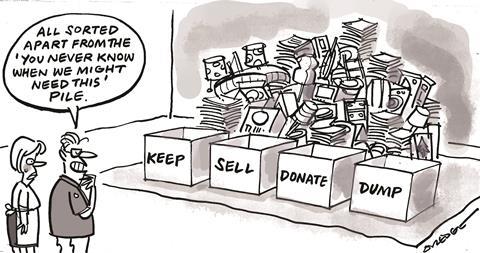Letting our stuff go is difficult, admits Jeff Lucas. But as we enter a new year, it’s a good discipline to develop

Moving house is very stressful.
I know, I’m describing a first world problem. I’m aware that compared to the challenges millions face with war, displacement, economic deprivation and a host of other gargantuan difficulties, encountering a few chaps with a large removal van is no real hardship. Nevertheless, our recent weeks have been a whirlwind of packing, often accompanied by some thoroughly unchristian muttering. I have wondered if hell might involve endless, eternal relocating.
I’d felt that we were rather accomplished in navigating house moves – twice we’ve shifted our worldly possessions across the Atlantic Ocean. One of those earlier moves involved emptying a cobwebby loft, which created even more acute torment. Stumbling in the half-light between joists and catching my hands on horrid yellow silicone insulation material, I managed to poke myself in the eye with an old TV aerial, prompting yet more muttering. We discovered elderly table lamps so ugly that they should never have seen – or been – the light of day, and boxes of photos of total strangers, or at least of people that we’ve forgotten.
But this latest move was the worst of all. Some studies suggest that moving is the most stressful event after bereavement or divorce – an urban myth that is unproven. That said, our decision to downsize certainly generated tension. The anxiety wasn’t caused by the presence of the burly chaps, grunting and groaning as they steered our furniture through the front door. Nor the couple of breakages and scuffs they left as souvenirs. Rather, the main pressure came from the hard work of purging that was required before the moving men even darkened our doors.
We discovered two vital truths about stuff. First, in living life at speed, as we have, you quickly accumulate chaos. We piled up documents with the intention of filing them later, where the little stacks were left for a decade. When your days are spent in a hurry, this or that can easily be disposed of into drawers, resulting in many drawers filled to the brim with, well, this or that.
But in purging, we discovered our possessions can develop a strange power. We’d determined to be ruthless; we sold and donated what we could, made repeated trips to the local recycling and rubbish dumps, committed to relentlessly discarding. Yet in the process, we found out that stuff, even relatively useless stuff, is sticky. It doesn’t want to part company with us without putting up a good fight.
While sorting, we repeatedly heard the insane whisper: You never know when we might need that. We found out that stuff demands an irrational allegiance, an unreasonable faithfulness, even a mild form of worship. The cold truth was simple – the stuff had to go. And, as it did, we felt a strange exhilaration. We had successfully negotiated a clear out – and what remained felt like a reflection of cleared hearts and minds; a little less cluttered and encumbered.
Perhaps, in bidding so many things goodbye, we found there wasn’t a need to hoard. The power to possess had been challenged, if only a little. After all, we only rejected the things that were no longer valuable to us: this was no Mother Teresa triumph over materialism. But we took a faltering step, learning a small lesson – one that the marketers and advertisers would appreciate we didn’t.
Let’s be grateful when we have enough, generous when we have the opportunity to help those who don’t and reserve our worship for the only one who is worthy. Because things are just things. Stuff is only stuff. To put it more eloquently, and indeed biblically: “Life does not consist in an abundance of possessions” (Luke 12:15).






































No comments yet